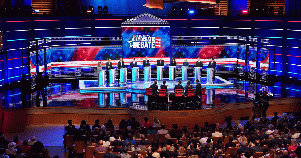While I recognize that it was the DNC that decided that rather than have more debates with fewer candidates participating in each, the manner in which the corporate media handled and moderated these "debates" left their audiences with little new understanding of the candidates or the issues.
Having 10 people on stage, with 60 seconds to talk about multiple complex issues and 15 seconds to rebut something is no way to obtain any substance or details. Unfortunately, this format actually fits very nicely into the 140 character limit of many peoples' attention span. This debate format was basically just a forum for sound bites and "got ya's", not for any form of meaningful discussion.
Source: Bloomberg
This chart shows how much time each candidate was allowed to speak and clearly shows how the corporate media plays favorites with those it wished to anoint as front-runners. How can one person be allowed over 12 minutes, while another is allowed 2 minutes? In the first debate Warren was called on for a second time before half of the other candidates had even been heard from the first time. The 2nd debate clearly had the "journalists" favoring the politicians, and ignoring those outside of the system like Yang and Williamson. Williamson had to wait on stage for 27 minutes before she was even called upon with a question. Those who interrupted the most, received the most speaking time. Just we need, "leaders" who interrupt others from speaking, NOT!
How can this even be considered fair or informative by anyone?
This entire circus was a disgrace and "we the people" need some alternate entity to replace the corporate media and step in and provide us with the information we need to make informed decisions. One commercial actually advertised the qualities of one of these celebrity journalists moderating the debate and received almost as much time as one of the candidates.
Given the reality that there are so many candidates participating in each debate, here are some suggestions that either the corporate media or some alternative entity might consider that could improve the transfer of useful information to the audiences:
- Would it not have been better to focus on fewer issues and save the other issues for another evening? This way each candidate would have had time to articulate the issue and their positions on it.
- Every candidate should receive the same amount of speaking time. How about simply dividing the number of candidates by the total time of the debates minus introductions, breaks, questions or whatever. EACH candidate receives that allotment and are timed while they are speaking, even if 2 of them are speaking at the same time. Candidates do need time to respond to other candidates, follow up questions, or rebuttals. They should be allowed to do so, but as long as they are speaking, it comes out of their allotted time., even if there are 2 of them speaking over each other. If they talk too long, it could leave them open to not having enough allotted time left later in the debate to respond where they might wish to. Everyone has their say, and the incentives to interrupt would be reduced.
- How about separate interviews with each individual candidate? This would provide enough time to explore complex issues in depth. This should be done with probing questions and challenges to the candidates statements. The questioning should be done by people who would actually know the candidate's history, voting records, and previous statements, not these celebrity journalists with their own agendas.
I stopped watching corporate news years ago, but returned for these debates hoping to get a sense of the candidates. I was disappointed, and was clearly reminded why I stopped watching in the first place.







